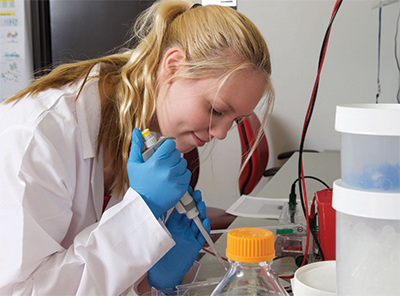Chapter president inspired by mother鈥檚 diagnosis
When she learned that her mother had been diagnosed with colon cancer, Amanda Duplan changed her plans. Duplan was a freshman at in Iowa, more than 1,700 miles from her family home in Sacramento, California, when she got the news three years ago.
“Instead of getting depressed, I’ve been inspired to help others going through similar situations,” she said.
 Amanda Duplan, a senior at Grand View University, plans to pursue a Ph.D. in biochemistry and molecular biology with an interest in immunotherapy.
Amanda Duplan, a senior at Grand View University, plans to pursue a Ph.D. in biochemistry and molecular biology with an interest in immunotherapy.
Duplan has always loved science, she said, but her mother’s diagnosis inspired her to get involved in research. Duplan started her freshman year on a premed track, but she found that her true passion was to study the underlying cause of disease.
Her undergraduate research focuses on engineering a PETase that will break down PET plastic more efficiently. , an assistant professor of chemistry, has played a major role in Duplan’s education at Grand View. Duplan started her research in Hall’s lab during her sophomore year, and Hall chose Duplan to work with her at the University of Iowa during a research fellowship last summer.
“She has been great at helping me through the bad times,” Duplan said of Hall. “She is an amazing person and an amazing professor.”
Hall also had a role in the founding of the 涩里番 at Grand View. Hall first learned about Student Chapters at an ASBMB annual meeting. She brought the idea back to campus and started the chapter with the help of Duplan and other students. She serves as the faculty adviser for the chapter.
This year, Duplan became the chapter president. She has worked to encourage involvement in the chapter by planning fun events such as a liquid nitrogen ice cream social. Duplan had wanted to make ice cream ever since she discovered the liquid nitrogen used for NMR experiments on campus. Chapter members worked as a team and invited fellow students to participate.
The chapter continues to grow, and science outreach is a major focus, Duplan said. “I like having a common goal of doing something for other people.”
Duplan also serves as her chapter’s student mentor for the Connect Researchers, Educators and Students, or CREST, group. Her group will design a physical model of a protein and present it at the ASBMB annual meeting in Orlando.
Duplan’s experience as chapter president has helped her become a better organizer and delegator, she said. She has strengthened her leadership skills by serving as a peer leader for science classes, a senior research mentor and the captain of the women’s bowling team. Her optimism and determination in the face of challenges have been instrumental to her success at Grand View.
Duplan’s mother is receiving treatment and continues her fight against cancer. “I’ve had to deal with many setbacks, but my family has encouraged me to keep going,” Duplan said.
Duplan will graduate from Grand View in May. She plans to apply for postbaccalaureate programs before entering a Ph.D. program in biochemistry and molecular biology with an interest in immunotherapy. Her goal is to be a professor so she can teach young scientists and do research.
Enjoy reading ASBMB Today?
Become a member to receive the print edition four times a year and the digital edition monthly.
Learn moreGet the latest from ASBMB Today
Enter your email address, and we鈥檒l send you a weekly email with recent articles, interviews and more.
Latest in People
People highlights or most popular articles

Truttmann recognized for cell stress research
He was honored by the Cell Stress Society International for his work on heat shock protein 70.

Understanding the roles of extracellular matrix and vesicles in valvular disease
MOSAIC scholar Cassandra Clift uses mass spectrometry and multiomics to study cardiovascular calcification and collagen dysregulation, bridging her background in bioengineering and biology to investigate extracellular vesicles and heart disease.

Learning, leading and lifting others
Tigist Tamir鈥檚 journey from aspiring astronaut in Ethiopia to cancer researcher at the University of North Carolina highlights the power of mentorship, persistence and curiosity in shaping a scientific career focused on discovery and equity.

Biochemists and molecular biologists sweep major 2025 honors
Recent Nobel, MacArthur and Kimberly Prize honorees highlight the power of biochemistry and molecular biology to drive discovery, including immune tolerance, vaccine design and metabolic disease, and to advance medicine and improve human health.

Subramanian receives electron microscopy honor
He delivered remarks at the International Conference on Electron Microscopy in Bangalore, India.

Bioart for fall: From order to disorder
The cover of the fall issue of ASBMB Today was created by ASBMB member, Soutick Saha, a bioinformatics developer at Wolfram Alpha LLC.

